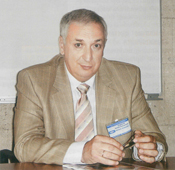|
1.03.10
Over 80% of border-crossing check-points are equipped with the latest stationary systems for radiation monitoring "Yantar"

The Russian borders are annually crossed by tens of thousands of goods with increased radiation levels, some of them illegally. The efforts of the customs officials aimed at assuring the non-proliferation controls of radioactive materials are the subject of our conversation with Nikolai KRAVCHENKO, Deputy Manager of the Information Technologies Department of the Federal Customs Service of Russia.
Nikolai Emmanuilovich, please tell us about the activities of the customs related to the assurance of nuclear and radiation safety. What are the tasks that the customs of-ficers are called upon in this area? How do you go about handling these tasks?
The Federal Customs Service of Russia is to perform the customs control function over the fissionable and radioactive materials as they cross out national borders.
Our key task is three-fold. The first part of it is to prevent unsanctioned export out of and import into Russia of nuclear material and radioactive sources (the nonproliferation of nuclear and radioactive materials). The second part is assurance of safe handling of the discovered radioactive sources, that is, safety of the people and of the environment. And the third and final part is to bring the violators to justice.
Today, our specialised division for customs control over fis-sionable and radioactive materials consists of some 500 customs officers. All point of border-crossing include specialised groups that exercise radiation control and whose specialists are experienced in handling radioactive materials.
Over 80% of border-crossing check-points (by rail, automobile, air) are equipped with the latest stationary systems for radiation monitoring, and it is expected that by 2011 all of the check-points nation-wide will be fitted with such systems.
Over the recent years, our Service has been annually registering 45-65 thousand cases of detection of articles that emit excessive ionising radiation - during attempts at both import and export. We compare the readings from our monitors with the information stated in the accompanying documents for the goods and if there are discrepancies we register the case as un¬sanctioned attempt at border-crossing.
However, the presence of efficient radiation monitors at the check-points is essential, but not sufficient for successful perform-ance of our task. What we also need is an efficient and adequate system for response to unsanctioned attempts of passage of radio-active materials. That is why today we are in the process of creating a nation-wide information control system that would connect all radiation control monitors into a single system. It will be able to track and control the situation at all of the Russian border-crossing check-points. Such a system is not yet available in any country of the world; the plan is to have it completed by 2015.
In addition to that, we perform continual training of our per¬sonnel so that they are ready to act promptly and professionally in response to an attempt at unsanctioned movement of radioactive materials. Primary training and regular advanced training of our customs officers is conducted by the branches of the Russian Customs Academy in Vladivostok and Saint-Petersburg.
How many violations do you record? What types of cargo are they associated with?
In 2008 we registered about 1.5 cases of illegal transport of goods and vehicles with excessive levels of ionising radiation, nuclear and radioactive materials. This is many.
Only 20% of the cases relate to illegal export of dangerous materials to other countries, with 80% occurring at import into Russia or transit through the Russian territory. Normally, these are sources of ionising radiation, food products, construction materials, faience, porcelain, granite, etc. We stop the cargo from crossing the border if its level of radioactivity, even natural, is above the sanitary norms that apply in our country. For example, our customs officers have returned food concentrates to Ukraine, and have repeatedly turned back Chinese goods such as bathroom equipment, toys, and gypsum boards.
What is your interface with the accident-response and rescue formations of the Rosatom Corporation?
Whenever we detect an attempt at illegal crossing of a radioactive source or nuclear material, this situation, from safety considerations, is classified as a radiation accident or emergency. Handling of the material must be performed by a specialised re¬sponse crew whose area of coverage spans across this particular region. So we call the specialised regional emergency-response and rescue forces, which are equipped with the necessary equipment (including robotics) and special transport vehicles.
We also co-operate closely with FSUE Rosatom's Crisis Centre. And through our duty service we stay in constant contact with the emergency-response and rescue teams of the Rosatom Corporation throughout Russia, from Vladivostok to Saint Petersburg.
Thus, through joint efforts we address our most important assignment - prevention of proliferation of nuclear and radioactive materials.
Source www.atomic-energy.ru |
